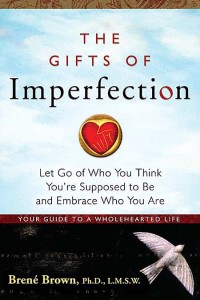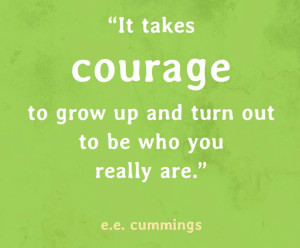 Last Monday I did a post about Brené Brown’s appearance on Super Soul Sunday. I mentioned Brown’s book, The Gifts of Imperfection, and ordered it immediately. Today I’m going to share a few reflections as I begin reading what Brown calls “Your Guide to a Wholehearted Life.”
Last Monday I did a post about Brené Brown’s appearance on Super Soul Sunday. I mentioned Brown’s book, The Gifts of Imperfection, and ordered it immediately. Today I’m going to share a few reflections as I begin reading what Brown calls “Your Guide to a Wholehearted Life.”
The book has 10 chapters that she calls “Guideposts,” and I haven’t even gotten to those chapters yet, so this is just a few thoughts I’ve gleaned from her introductory chapters. Each one is packed with information and insight, so I don’t want to hurry my reading of this book or its impact on my life.
I turned 63 last week, so I’m past what most people would call “midlife.” I already had my midlife “crisis” about twenty years ago. And yet, I seem to circle my wagon back around the same issues that almost derailed me at forty—mostly having to do with the disparity between my dreams and my life as I was living it at the time. I feel that same distance today. Brown explains why:
People may call what happens at midlife ‘a crisis,’ but it’s not. It’s an unraveling—a time when you feel a desperate pull to live the life you want to live not the one you’re ‘supposed’ to live. The unraveling is a time when you are challenged by the universe to let go of who you think you are supposed to be and to embrace who you are.
As I read those words, I feel that I have been unraveling for much of my life. Brown explains that it’s not just midlife when one can experience this, but also at any significant life changes, such as “marriage, divorce, becoming a parent, recovery, moving, an empty nest, retiring, experiencing loss or trauma, or working in a soul-sucking job.” I have experienced most of the changes on that list, and you probably have, too. So how do we get through these situations in what she calls a “wholehearted” way? She defines three tools that we need—and these three will be expounded on more throughout the book—to let go of the things that are holding us back as we work our way through this journey. Here’s a peak at the tools—courage, compassion and connection.
COURAGE
The root of the word courage is cor—the Latin word for heart. In one of its earliest forms, the word courage had a very different definition than it does today. Courage originally meant ‘To speak one’s mind by telling all one’s heart.’… Today courage is more synonymous with being heroic…. Heroics is often about putting our life on the line. Ordinary courage is about putting our vulnerability on the line.
 What she’s talking about here is the courage to reach out to another person and share our shame stories—to tell them what we did that’s making us feel crappy. I talked a little bit about this in last Monday’s post. Especially about why it’s important WHO we choose to share with. It needs to be a person we can trust to hear us with compassion, without judgment or the need to “fix” us. Someone who has proven to also have the courage to say, “Oh, I’ve done that, too.” Or as Brown says, it must be someone who is willing to go into the darkness with us in order to help us find the light.
What she’s talking about here is the courage to reach out to another person and share our shame stories—to tell them what we did that’s making us feel crappy. I talked a little bit about this in last Monday’s post. Especially about why it’s important WHO we choose to share with. It needs to be a person we can trust to hear us with compassion, without judgment or the need to “fix” us. Someone who has proven to also have the courage to say, “Oh, I’ve done that, too.” Or as Brown says, it must be someone who is willing to go into the darkness with us in order to help us find the light.
COMPASSION
The word compassion is derived from the Latin words pati and cum, meaning ‘to suffer with.’
 That person we choose to share our stories with should be able to suffer with us. Brown was impressed with the American Buddhist nun Pema Chödrön’s writing on compassion and relationships:
That person we choose to share our stories with should be able to suffer with us. Brown was impressed with the American Buddhist nun Pema Chödrön’s writing on compassion and relationships:
Compassion is not a relationship between the healer and the wounded. It’s a relationship between equals. Only when we know our own darkness well can we be present with the darkness of others. Compassion becomes real when we recognize our shared humanity.
This is powerful stuff. I believe this compassion has to start with a love and acceptance of ourselves. Combine that with courage, and we can reach out to others. This reaching out is the third tool Brown talks about.
CONNECTION
Many of us are willing to extend a helping hand, but we’re very reluctant to reach out for help when we need it ourselves. It’s as if we’ve divided the world into ‘those who offer help’ and ‘those who need help.’ The truth is that we are both.
 I love this. My journey has brought me through times when I was almost exclusively one of “those who offer help.” I was a woman’s retreat speaker, chairman of many committees, a busy volunteer. There were some years when a number of people would call me for advice (a few still do) or a shoulder to cry on in a crisis. During those years I found myself only willing to ask for help from someone “above” me—like a spiritual father (pastor) and mother (nun) with whom I had developed a relationship. Or someone with professional training in psychology. There’s nothing wrong with these relationships, as long as they are healthy ones. But most of us live ordinary lives among ordinary people, and we need to develop a healthy connection with those around us—especially with a chosen friend or two who have earned the right to hear our stories.
I love this. My journey has brought me through times when I was almost exclusively one of “those who offer help.” I was a woman’s retreat speaker, chairman of many committees, a busy volunteer. There were some years when a number of people would call me for advice (a few still do) or a shoulder to cry on in a crisis. During those years I found myself only willing to ask for help from someone “above” me—like a spiritual father (pastor) and mother (nun) with whom I had developed a relationship. Or someone with professional training in psychology. There’s nothing wrong with these relationships, as long as they are healthy ones. But most of us live ordinary lives among ordinary people, and we need to develop a healthy connection with those around us—especially with a chosen friend or two who have earned the right to hear our stories.
Stay tuned for future posts from this powerful book. And of course I’d love to hear from my readers who are on this journey with me.
I am a big fan of Brene Brown. I’m glad Oprah found her to share these valuable lessons with the hurting world. The sharing of our stories is so important to healing, but you have to know whose the right person. Jesus told parables to teach about love. Seems it always began with some crisis, love was manifested, and it doesn’t say “they lived happily ever after.” It’s says rather that they were touched by love. Love you this day. Susan
Thanks so much, Susan. Love you, too.